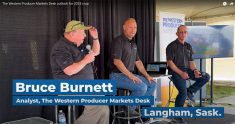A 1,000-page ruling by the World Trade Organization on a dispute involving Europe’s moratorium on genetically modified crops will have little impact on the resumption of trade in commodities like canola, says a trade expert.
“Take a Valium. It’s not going to happen in the near future anyway,” said Bill Dymond, senior fellow at the Centre for Trade Policy and Law at Carleton University in Ottawa.
While the decision moves the debate in favour of those pushing for the acceptance of biotech crops, it does not resolve anything because the GM issue has moved beyond the realms of science and trade.
Read Also

One Beer Market Updates Day 3 – Lentils and beef
Day 3 of the One Beer Market Update at Ag in Motion 2025.
“Public opinion on the continent has been so swayed that the Europeans will have enormous difficulty in conforming with the decision,” said Dymond.
The WTO ruling stems from a 2003 complaint filed by Canada, Argentina and the United States, alleging practices adopted by the European Community in 1998 amounted to a moratorium that unfairly restricted imports of agricultural products.
Biotech supporters have claimed victory in the confidential WTO ruling that was leaked to outside interests, calling it a “turning point” for the industry.
Groups on the other side of the issue contend the pro-biotech forces won on only one of the nine complaints they brought forward. And they point out the WTO didn’t recommend any further action since the moratorium ended in 2004.
Dymond said both sides will put their spin on the landmark decision, which will probably be appealed by Europe, but in the end the document will do little to resolve the longstanding trade irritant.
“It’s never over until it’s over and it’s never over in this type of dispute because you’ve got a clash of two solitudes. You’ve got the science that tells you one thing and you’ve got public opinion that wants you to go in a different direction.”
He suggested Europe will move from an unofficial to a legal ban on GM crops until public opinion changes, which is what some exporters feel has already happened.
Dymond said biotech developers like Monsanto lost this debate a long time ago when they stood by and watched the “Frankenfood types” poison public opinion.
“Once that happens, it’s very hard to change (public opinion). You can’t change it by having our agriculture minister talk to their agriculture minister.”
That is because the European Union’s agriculture minister has “a howling mob” outside his door.
Dymond said there is no trade issue more sensitive than food safety. People will accept job losses and economic slowdowns as the consequence of their government’s trade policies, but they will not tolerate unsafe food.
When it comes to food safety, there is a much higher degree of distrust in Europe than there is in North America as evidenced by how the public responded to the discovery of the H5N1 strain of avian flu on a turkey farm in eastern France.
“What happened to French poultry production? It’s in the dumpster. What happened to beef consumption in Canada after BSE? It remained stable,” said Dymond.
“So when the French food inspectors say it’s OK to eat poultry, the French consumers say, ‘up yours.’ Whereas in Canada and the United States we say, ‘well, if the regulators say it’s OK it must be OK.’ “
Until that skepticism subsides, it doesn’t matter what the WTO decides because European politicians are beholden to the electorate.
“This is not something that can be easily solved because it’s not a straightforward clash between competing trade interests,” said Dymond.

















